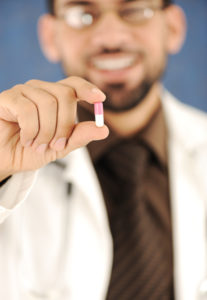Drug Bust

The FDA approval of Addyi (flibanserin) to treat hypoactive sexual desire disorder (HSDD) in premenopausal women on August 18, 2015, to a large extent, was due to the efforts of the marketing campaign of an organization called Even the Score. A press release applauding the approval of Addyi listed 26 organizations, including the National Organization for Women, who were supporters of Even the Score. “Even the Score was established to serve as a voice for American women who believe that it’s time for the FDA to level the playing field when it comes to the treatment of hypoactive sexual desire disorder (HSDD).” But less than two years since its assistance in bringing about “a breakthrough moment for women’s health,” the organization is gone; vanished.
The Even the Score press release that celebrated the approval of Addyi noted there had been a steady drumbeat of support for women’s sexual dysfunction treatment from lawmakers, women’s rights groups, medical experts and consumer organizations. See the press release for a listing of these organizations. The Chair of the Even the Score campaign, Susan Scanlan, said: “Women deserve the safety and peace of mind that comes with access to FDA-approved medical treatments for HSDD.” Dr. Lisa Larkin, the Scientific Co-Chair of Even the Score said:
We applaud the FDA for acknowledging the clear science that supported approval of flibanserin, for starting a conversation that will define the next generation of progress in sexual rights and sexual health, and for empowering women to take control of their health in ways they never thought possible.”
But according to Alycia Hogenmiller, Alessandra Hirsch and Adriane Fugh-Berman, Even the Score was a fake feminist group created by Sprout Pharmaceuticals “so that they could get a bad drug approved by the Food and Drug Administration.” Writing for The Hastings Center in “The Score is Even,” the co-authors described how Sprout Pharmaceuticals hired Blue Engine Media, a PR firm, to create Even the Score. The Hastings Center is a nonpartisan bioethics research institute. And the coauthors of “The Score is Even” are affiliated with PharmedOut, a research and education project of the Georgetown University Medical Center that “promotes rational prescribing and exposes the effect of pharmaceutical marketing on prescribing practices.”
The Even the Score ad campaign hired two women who were both well-known to women’s groups. “Even the Score recruited and paid consumer advocacy groups to pressure the FDA into approving flibanserin for Hypoactive Sexual Desire Disorder—a condition previously created by industry to sell another drug.” The coalition did a Viagra commercial parody in 2014, which it said was “created to highlight the absurdity of the continued gender disparity in sexual health.” There is a link to the video in the press release. Members of Even the Score called Addyi: “the biggest breakthrough for women’s sexual health since the pill.” It was suggested there was possible “unconscious gender bias at the FDA.”
Two days after the approval of Addyi, Sprout sold the drug to Valeant Pharmaceutical for one billion dollars. Although Even the Score promised “to be there every step of the way” in the fight for true gender equality in sexual health, the victory video posted the day after Addyi was approved was the last posting on the Even the Score site. Completely dormant for many months, it disappeared entirely several months ago ( I couldn’t find it either). The last tweet from @eventhescore was from January 29, 2016 (I looked). The last post to the Even the Score Facebook page was January 28, 2016 (I looked there too).
In an earlier article for The Hastings Center on flibanserin, “The Drug that Cried ‘Feminism’”, Hirsch, Fugh-Berman and Rebecca Holliman described the drug as “Spanish fly, or horny goat weed, or one of the other aphrodisiacs that have been disappointing humans for millennia.” They noted how Sprout managed to convince the public and some women’s groups that flibanserin was a feminist cause. First, they created a narrative that branded anyone opposed to flibanserin as anti-woman. Then they hired two feminists to lobby women’s groups. They convinced NOW to join the cause. When there was some opposition from feminist groups about their feminist rhetoric, Even the Score and Sprout focused on the “scientific” evidence for flibanserin.
The point at which Sprout Pharmaceuticals’ innovative marketing bends sinister is in its misappropriation of feminist concepts. An oft-heard argument for approving flibanserin is “choice,” with the unstated subtext that women should decide about the risks and benefits of a drug on their own, sans pesky government interference. This implies that the FDA, the government agency charged with protecting the public from unsafe and ineffective drugs, is superfluous. That’s the way it was in the 19thcentury, pre-FDA, when we were giving children cocaine toothache drops.
A similar critique of Addyi (flibanserin) can be found in “Flibanserin: The Female Viagra is a Failed Me-Too Antidepressant.” The article was co-authored by Emily Wheeler, Madeline Brodt, Shannon Peters, and Lisa Cosgrove. The authors noted that HSDD (Female Sexual Interest/Arousal Disorder or FSI/AD in the DSM-5) is a classic example of disease mongering—creating a disease to promote a drug to treat it. A former president of the American Psychiatric Association admitted the possibility of such action in an article he wrote for the Harvard Review of Psychiatry:
The flexible boundaries of many psychiatric diagnostic categories, in the absence of definitive diagnostic tests, may encourage expansive definitions of affected populations and create opportunities for industry to promote treatments for people who would not previously been seen as having a disorder.
The empirical data supporting the diagnosis is weak, as is the clinical trial data used to approve Addyi (flibanserin). “Numerous researchers, clinicians, and policy experts, have questioned the validity of FFD and HSDD.” A systematic review and meta-analysis by Jaspers et al. in JAMA Internal Medicine, concluded that the benefits of flibanserin were marginal, particularly when the concurrent adverse effects are considered. “Treatment with flibanserin, on average, resulted in one-half additional SSE per month while statistically and clinically significantly increasing the risk of dizziness, somnolence, nausea, and fatigue. Overall, the quality of the evidence was graded as very low.”
Sprout admitted the effect is mild, only increasing the number of “satisfying sexual events” by less than one event per month. These events could include masturbation, but not necessarily orgasm. One of the statistics used in the Even the Score ad campaign, stating that 43% of women experience sexual dysfunction was from an older, highly criticized study. The often-repeated statistic of 1 in 10 women having HSDD was from a study funded by the pharmaceutical company that developed flibanserin, Boehringer Ingelheim. They sold the rights of the drug to Sprout Pharmaceuticals. The researchers conducting the study were either employees of Boehringer Ingelheim or paid consultants for the company.
The clinical effectiveness of Addyi (flibanserin) is questionable. The marketing campaign by Even the Score had significant influence on its approval process with the FDA. The so-called disorder it treats is mythical. But the numerous side effects from the drug are real. These potential side effects are so serious, that the FDA required special training and certification before providers could prescribe it. When flibanserin was approved, Janet Woodcock, the director of the FDA’s Center for Drug Evaluation and Research (CDER), said:
Because of a potentially serious interaction with alcohol, treatment with Addyi will only be available through certified health care professionals and certified pharmacies . . . Patients and prescribers should fully understand the risks associated with the use of Addyi before considering treatment.
Addyi can cause hypotension (severely low blood pressure) and loss of consciousness. These risks are increased and become more severe when used with alcohol, or when Addyi is taken along with CYP3A4 inhibitors such as: Prozac (fluoxetine), Luvox (fluvoxamine), and grapefruit juice. Here is a list of CYP3A4 inhibitors. Common side effects include dizziness, sleepiness, nausea, fatigue insomnia and dry mouth. Because of the sedation effects, it is recommended to take flibanserin at bedtime. Stop and think a minute. Addyi is a drug to treat sexual desire disorder that you take before going to bed … BECAUSE IT MAKES YOU SLEEPY!
The head of the National Women’s Health Network, Cindy Person, said: “This is a risky drug about which women and their doctors don’t get enough information.” Her organization produced an abysmal “report card” for Addyi. Among the listed concerns were that Addyi shouldn’t be taken with common medicines used to treat yeast infections, Chlamydia, syphilis, HIV and Hepatitis C. And taking hormonal birth control increased the risk of serious complications with Addyi. Writing for STAT News, Ed Silverman said: “Although some had great expectations for the drug, Addyi has, so far, been a bust.” For more on Addyi, see “A Pill for a Mythical Ill.”

